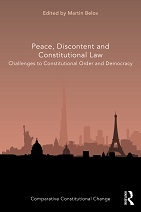edited By Martin Belov (Routledge May 2021, 296 pages)
About the book
This book offers a multi-discursive analysis of the constitutional foundations for peaceful coexistence, the constitutional background for discontent and the impact of discontent, and the consequences of conflict and revolution on the constitutional order of a democratic society which may lead to its implosion.
The volume provides the reader with a multi-discursive analysis of the constitutional foundations of peace, discontent and revolution. It explores the capacity of the constitutional order to serve as a reliable framework for peaceful co-existence while allowing for reasonable and legitimate discontent. It outlines the main factors contributing to rising pressure on constitutional order which may produce an implosion of constitutionalism and constitutional democracy as we have come to know it. The collection presents a wide range of views on the ongoing implosion of the liberal-democratic constitutional consensus which predetermined the constitutional axiology, the institutional design, the constitutional mythology and the functioning of the constitutional orders since the last decades of the 20th century. The constitutional perspective is supplemented with perspectives from financial, EU, labour and social security law, administrative law, migration and religious law. Liberal viewpoints encounter radical democratic and critical legal viewpoints. The work thus allows for a plurality of viewpoints, theoretical preferences and thematic discourses offering a pluralist scientific account of the key challenges to peaceful coexistence within the current constitutional framework.
The book provides a valuable resource for academics, researchers and policy-makers working in the areas of constitutional law and politics.
About the series
Comparative Constitutional Change has developed into a distinct field of constitutional law. It encompasses the study of constitutions through the way they change and covers a wide scope of topics and methodologies. Books in this series include work on developments in the functions of the constitution, the organization of powers and the protection of rights, as well as research that focuses on formal amendment rules and the relation between constituent and constituted power. The series includes comparative approaches along with books that focus on single jurisdictions, and brings together research monographs and edited collections which allow the expression of different schools of thought. While the focus is primarily on law, where relevant the series may also include political science, historical, philosophical and empirical approaches that explore constitutional change.
